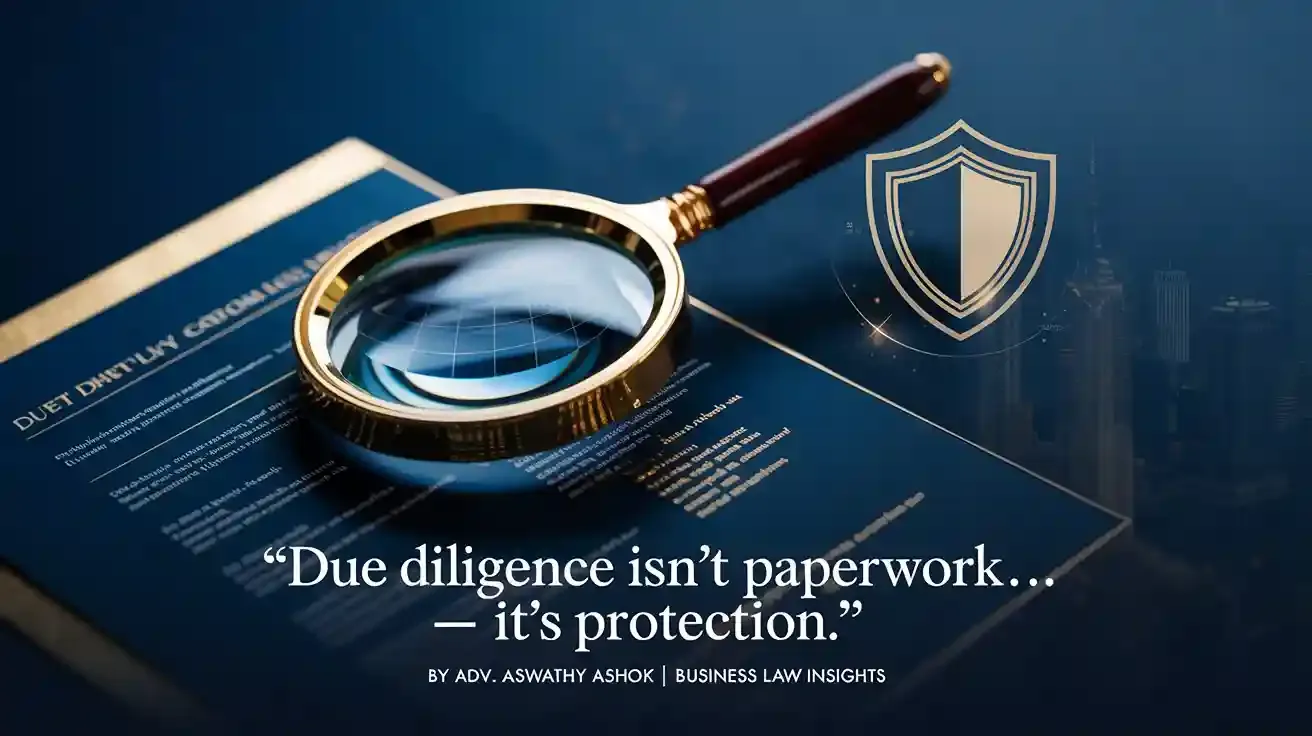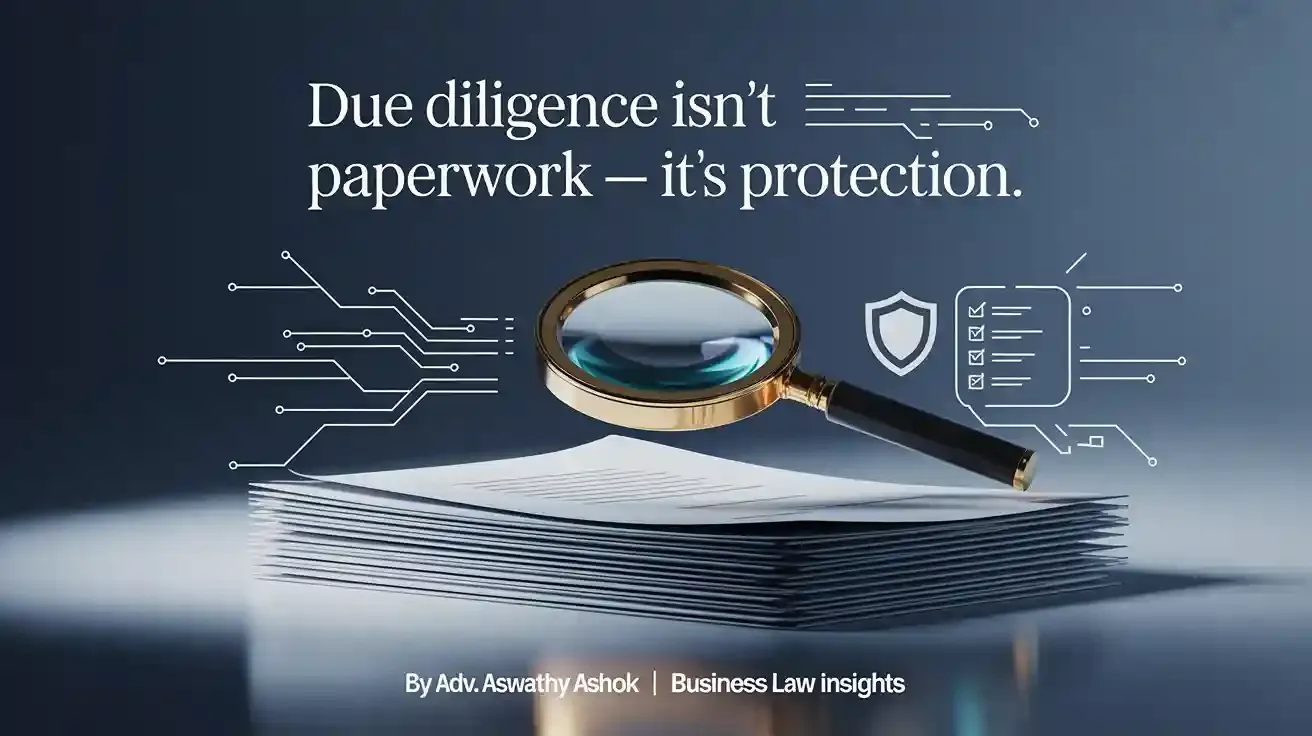Introduction: Behind every good business deal is a lot of careful checking
Let me put it straight: in Indian business, what you don’t know can hurt you. Sometimes badly. A deal might look perfect on paper—healthy profits, strong growth, clean assets—until someone lifts the lid. That’s where due diligence comes in.
Over the years, there have been companies that have walked into partnerships, acquisitions, or investments without asking the right questions. Some ended up absorbing huge liabilities they didn’t know existed. Others found themselves dragged into litigation for things they thought didn’t concern them. The truth is, you don’t find problems because you go looking for them. You find them because you know where and how to look.
That’s what due diligence is a practical, professional check of what you’re really getting into. It's not just about paperwork; it's about clarity, risk control, and decision-making based on facts, not assumptions.
WHAT IS DUE DILIGENCE?
In simple terms, due diligence is the process of investigating a company legally, financially, and operationally before making a major decision involving that company. It’s common during mergers, acquisitions, investments, or even when entering into significant contracts. In India, due diligence isn’t codified in one single statute, but it’s accepted across the board by lawyers, investors, auditors, and regulators as essential for assessing risks. It helps you understand not just what a company claims, but what it’s hiding or ignoring. In a country like ours, where compliance varies widely across sectors and states, this becomes even more important.
DIFFERENT SHADES OF DUE DILIGENCE
Not all due diligence looks the same. Depending on what the transaction is about, you’ll look at different things. But generally, it falls into three categories:
1. Legal Due Diligence
This involves checking whether the company has followed the law. You examine its incorporation, licenses, contracts, compliance with labour laws, and whether it’s facing any ongoing or past litigation.
For example, in one recent case, we found a manufacturing firm operating without a valid pollution clearance certificate. On paper, it was profitable. But legally, it was a disaster waiting to happen.
2. Financial Due Diligence
Here, you dig into the company’s accounts but don’t just stop at audited reports. You look at income tax returns, GST filings, TDS compliance, loans, receivables, and cash flow health.
Sometimes what you find is less about fraud and more about poor financial discipline. For instance, a growing startup had three years of investor money spent with barely any internal controls. It was a flag for any serious investor.
3. Operational Due Diligence
This is where you understand how the business really runs. Are vendor contracts documented?
Are employees legally employed? Is the data secure? Does the company have proper insurance?
It’s often overlooked, but this is where future liabilities quietly sit. In one transaction we handled, the company was using third-party software without a license. One IP infringement suit could’ve wrecked them.
HOW THE DUE DILIGENCE PROCESS ACTUALLY WORKS
Let me walk you through how this happens in practice in India. This is not theory this is how professionals actually approach due diligence on the ground.
Step 1: Define Why You’re Doing This
Every deal is different. If you’re investing ₹50 lakh in a startup, you won’t need the same depth of diligence as a ₹20 crore acquisition. So, we start by identifying what needs checking legal, financial, tax, regulatory, or all of it.
Step 2: Get the Documents
We send a checklist usually called a Due Diligence Questionnaire (DDQ) to the other side. It lists everything from incorporation papers to tax returns, property records, contracts, and IP filings. If it’s a serious transaction, we insist on a virtual data room a secure cloud folder where the target uploads everything.
Step 3: Go Beyond Documents
This is where experience matters. Documents alone don’t tell the whole story. We match GST filings with financial statements. We check court records for hidden litigation. We visit the MCA portal and IP registry. We even verify land ownership with state revenue departments.
One of the most common red flags? Share allotments without proper board approval or ROC filings. You’d be surprised how often this is missed especially in startups.
Step 4: Talk to the People
You can learn a lot by speaking to management. We ask tough questions Why was this license not renewed? Why are ESOPs not documented? Why does the company have cash sales without invoices?
Sometimes, it’s not what they say but what they hesitate to say that reveals the problem.
Step 5: Final Report
At the end, we prepare a red flag report. It doesn’t just list issues it explains what they mean. Is it a legal violation? A commercial risk? Can it be fixed? Or is it a deal-breaker? This report helps the buyer or investor decide should they proceed, renegotiate, ask for indemnities, or back out?
INDIA-SPECIFIC CHECKLIST: WHAT MUST BE REVIEWED HERE
Due diligence in India needs to be tailored for our regulatory setup. Here’s a short but vital checklist:
ROC filings and master data on MCA portal
GST registration, returns (GSTR-1, GSTR-3B), e-way bill history
Income tax returns, Form 26AS
TDS and TCS compliance
Labour law registrations: PF, ESIC, CLRA, Shops & Establishments
FSSAI license, PCB NOC, Factory license (if applicable)
Litigation search: District Court, High Court, NCLT, SEBI
Property documents: title deed, encumbrance certificate
IP registrations trademarks, patents, copyrights
Founders’ agreements and shareholder minutes
Employment agreements and ESOP records
WHO SHOULD DO THIS? NOT JUST ANYONE
Due diligence in India is layered. Don’t assume your internal finance team or admin staff can handle it. You need professionals who know what to look for and where to look.
∙Lawyers review contracts, compliance, and litigation
∙Chartered Accountants examine financials and tax filings
∙Company Secretaries look at board procedures and ROC filings
∙Sector experts check licenses, factory setups, and IT security
If you’re serious about risk control, get serious about who’s doing your diligence.
STARTUPS VS. M&A DEALS THE APPROACH DIFFERS
Startups With early-stage startups, the main risks are legal hygiene and sloppy documentation. Most founders focus on growth and ignore paperwork. So, when an investor shows interest, things fall apart under scrutiny.
Typical issues:
∙Founders haven’t signed a proper agreement
∙Shares allotted without proper board or shareholder approval
∙ESOPs announced but never issued legally
∙IP developed by freelancers, but ownership unclear
Mergers and Acquisitions
With larger companies or M&A, the risks are deeper contingent liabilities, land title disputes, employee disputes, SEBI non-compliance, etc.
These require much heavier diligence often spread across 4 to 8 weeks with sector-specific checks and cross-border elements in case of FDI.
WHAT ARE THE COMMON RISKS FOUND IN INDIA?
Here’s what we regularly find things that can delay or destroy deals:
∙Pending litigation not disclosed
∙Incorrect shareholding records
∙Improper GST filings or tax arrears
∙Expired or fake licenses
∙Title disputes over factory land
∙Labour compliance violations
∙IP ownership not clear or unregistered
∙Regulatory notices quietly buried
Each one of these has the potential to turn a deal toxic.
REAL-LIFE EXAMPLE: ZEE–SONY MERGER COLLAPSE
In 2024, the ₹24,000 crore Zee–Sony merger fell apart not because of market issues, but due to red flags found during due diligence. Sony raised concerns about financial irregularities and ongoing regulatory investigations against Zee’s top leadership. Had this sensitive information leaked, the fallout could’ve been worse. This is exactly why NDAs are critical during mergers they protect confidential data even when a deal doesn’t go through.
CONCLUSION DUE DILIGENCE ISN’T A FANCY TERM. IT’S SELF-PROTECTION.
A lot of people treat due diligence as a tick-box exercise. That’s a mistake. In Indian business, paperwork often tells only part of the story. It’s up to you or your lawyer to dig deeper.
Due diligence helps you ask the uncomfortable questions before the deal, instead of answering them in court after the deal.
If you’re about to invest, buy, merge, or even enter a major services contract stop. Do the diligence. Not to tick a legal requirement. But to protect your capital, your reputation, and your peace of mind.
And if you're on the other side the one being scrutinized, use the process as a mirror. If your house isn’t in order, fix it before someone else walks in and finds the mess.

